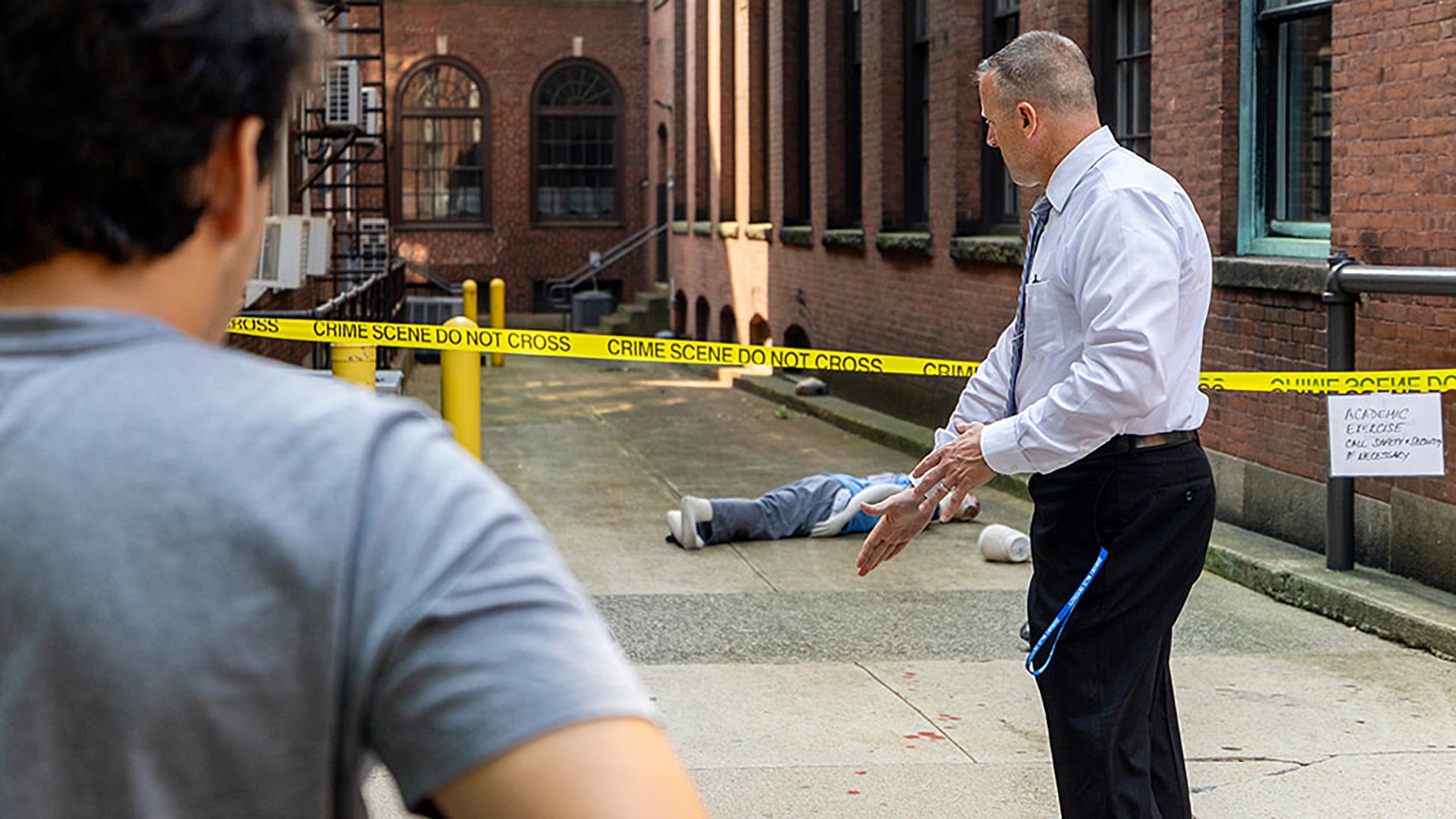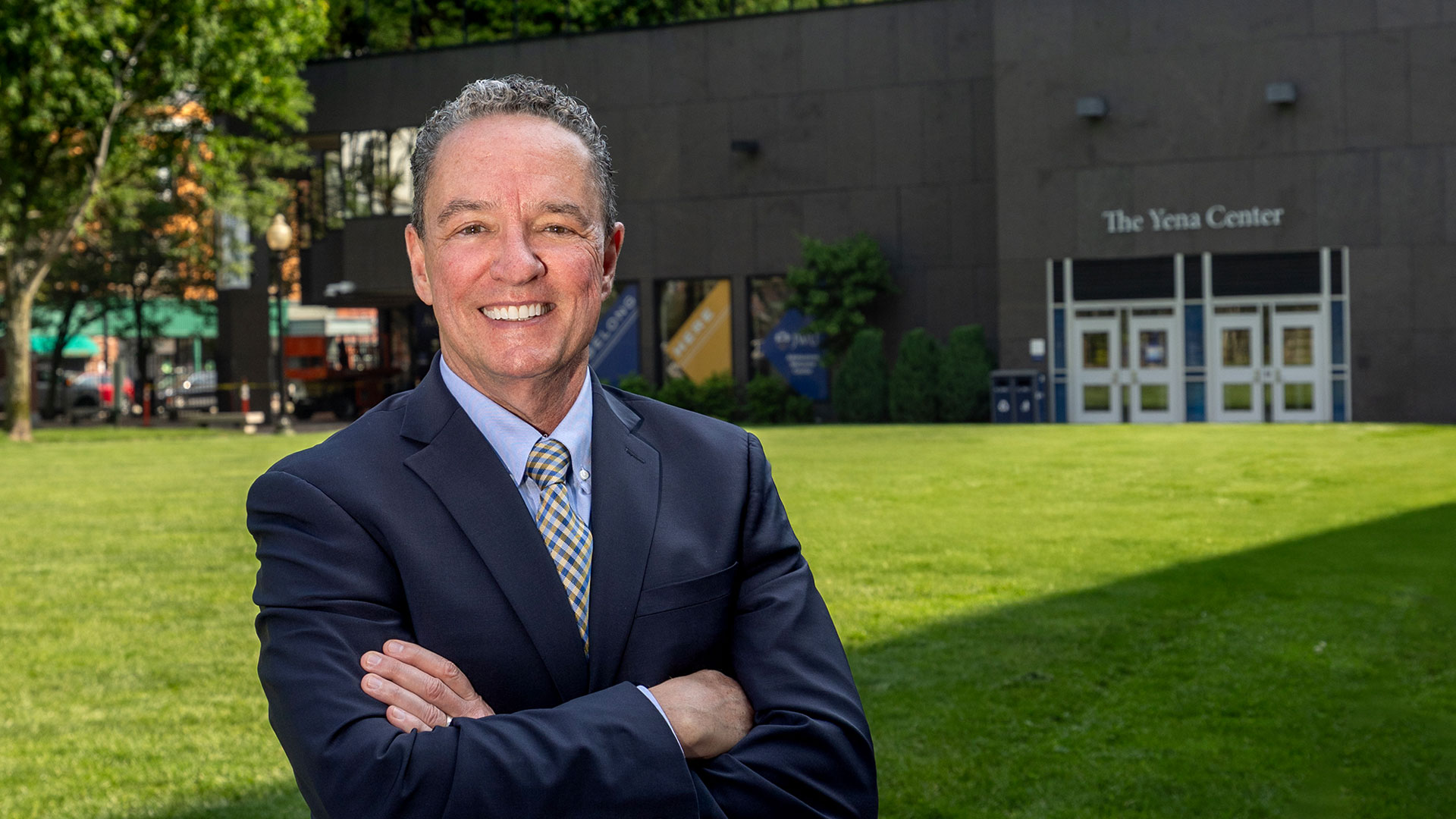Navigating JWU with a Learning Disability
If you struggle to read, write or focus on homework or projects, you’re not alone: As many as 1 in 5 students could have a Specific Learning Disability (SLD) such as dyslexia, dysgraphia or dyscalculia, or have Attention Deficit Hyperactivity Disorder, according to the National Center for Learning Disabilities. As learning disabilities and disorders are invisible, you wouldn’t be able to tell by looking at your classmate, roommate or teammate whether or not they have one. But it’s important to know that if you or someone you know needs resources to succeed, Johnson & Wales is here for you. Typically, around 8-9% of JWU students seek support for a learning disability or disorder. This year, with more student awareness of JWU’s resources to help them, that number has climbed to 12%.
Here’s a look at how two Wildcats, Noah and Jenna, have been navigating JWU with LDs, as well as how JWU’s Accessibility Services on both the Providence and Charlotte campuses provides resources every step of the way.

Discovering a Learning Disorder
"In elementary and middle school, I did not know I had a disability," reveals Noah, who is on track to earn his B.S. Culinary Arts & Food Service Management from JWU in 2022 and then his MBA – Hospitality in 2023. "I just always thought I took tests slower than other people. I was always the last person to finish, and sometimes I wouldn’t even be able to finish the tests. I always just assumed I was slower in speed than everyone else and my anxiety made me slower."
So how did Noah find out?
"In high school, I noticed as the tests were getting longer and more difficult, I was really having trouble finishing them, so I decided to get tested to see if I would qualify for accommodations," he explains. "I found out I have a decreased processing speed which makes tests and other assessments very difficult for me. Once I received the accommodations, I found I was performing better on tests and not having to rush to bubble in questions without reading them just to try and earn credit on unanswered questions before my time ran out."
Jenna, a JWU ’22 Psychology major, had a similar experience in not receiving any support for her learning disability until high school. "It became pretty clear to me in middle school that I could know the material but would perform horribly on assessments," Jenna says. "My test anxiety was causing me to not perform as well as I knew I could."
So what happened?
"At that point, my parents realized that there was a problem and they brought me to get tested for a LD. After receiving the results, I began to be supported in high school, and I have continued to be supported in college."
What if you don’t know if you have a learning disability?
"We often see students who have always struggled with their learning and do not understand why they seem to work harder than other students and yet struggle more than others," says Director of Accessibility Services Nicole Hebert, MSW, LICSW. Hebert also serves as director of the Wildcat Learning Effectiveness in Action (LEAP) program at JWU’s Providence Campus, a fee-based educational program designed to help students discover how they learn and to develop specific strategies to enhance their learning.
"We encourage all students who think they may be eligible for our services to reach out to Accessibility Services and meet with one of our advisors. We can provide referrals for neuropsychological testing if it seems appropriate. We also work with students who graduated high school many years prior, causing their documentation to be outdated," Hebert says. "We support these students with obtaining the needed testing and documentation in order for them to obtain the accommodations for which they are eligible."
Getting Support for a Learning Disorder
Support for learning disabilities may not be at the top of everyone’s college search list, but it could make a big difference in your academic success.
"I knew there was support available at JWU, but I really found out about it when I got here," Noah says. "I found my great [Accessibility Services] advisor Shelly [Olausen], and she has been there to support me throughout my entire journey. Whether it was something as simple as scheduling a test in the testing center or helping me to advocate in classes I was having trouble with, she was there through it all and always supported me."
"I feel so grateful that JWU had such a strong network of support for my learning disability."
"I did not prioritize looking for LD support while looking for a college, but I feel so grateful that JWU had such a strong network of support for my learning disability," Jenna shares. "I have worked with [Accessibility Services Advisor] Hinda [Levin-Kreiger] while here, and she has been truly amazing and so helpful throughout my time at JWU. I felt truly understood, heard, and respected. No matter what, they are there for you to provide assistance and support and to make sure that you are feeling that way. I would absolutely recommend JWU for LD support. I did seek out accommodations, and I am so glad I did. Hinda made the process seamless and entirely up to me based on what I felt I needed."
Adds Noah, "I have had nothing but success when working with Accessibility Services. They have helped me have an environment where I know I can go if I need anything. The staff are always looking out for our best interest and ensure us that they can help with whatever we need. I have used my academic accommodations in any class that has a test or quiz where I felt I needed to spend more time answering the questions. The testing center and accessibility services staff have made my ability to succeed as seamless as possible."
An Introduction to JWU’s Accessibility Services
"We serve students with a myriad of learning disability diagnoses including learning disabilities in reading, writing and math, such as Dyslexia or Dyscalculia or Dysgraphia; other students have general math, reading and writing disabilities, and others have learning disabilities related to expressive and/or receptive language," explains Hebert. "We serve many students with learning differences in the area of executive functioning. These are students who may be diagnosed with ADHD and/or Generalized Anxiety Disorder. Executive functioning includes proficiency in adaptable thinking, planning, self-monitoring, self-control, working memory, time management, and organization."
Hebert shares a bit more about how Accessibility Services helps JWU students with LDs succeed. "Accessibility Services support students with learning about and understanding their learning differences. Based on their needs, an accommodation plan is developed to support their learning. The students served in Accessibility Services are required to complete the same exams and assignments as all other students; coursework modifications are not permissible at the college level. Accessibility Advisors meet with students as needed to provide support and assist students with developing their self-advocacy skills. Developing their understanding of self and their self-advocacy skills serve students throughout their time at JWU and well beyond."
Director of Academic Support RJ Kilgore, MS, CRC, LCMHC, works with students at the JWU Charlotte Campus’ Academic & Career Excellence Center. "JWU is proud of the diversity that is present in its student population,” Kilgore states. "We acknowledge and promote disability as diversity and use this to strengthen our efforts towards creating an inclusive environment for all students. We serve students with various disabilities including specific learning disabilities."
"I felt truly understood, heard, and respected."
"JWU creates an inclusive environment for all students by directing intentional effort towards accessibility in all areas and aspects of campus life,” Kilgore adds. "Both campuses have offices of Accessibility Services who are responsible for facilitating requests for, and provision of, reasonable accommodations to students with disabilities. Often, students with disabilities, including those with learning disabilities, work with staff from these offices to discuss their individual needs and engage in the interactive process to determine what accommodations are necessary to ensure they have equal access to their living and learning environment."
Advice for Anyone with a Learning Disability
As students with learning disabilities, Jenna and Noah are happy to share some advice for others who may be looking at schools like JWU and wondering if their own LDs will affect their success in college.
- Accept support. "My advice is to allow yourself to be supported by the accessibility staff here," says Jenna. "They truly want you to succeed, and there is no shame in being open to help.
- Advocate for your LD. Jenna continues, "Self-advocacy is key. In order to get help and support, you must go and seek it out. The only person who can advocate for you at the start of the process is you. Once you connect to accessibility services, they will also advocate for you, but you must take the first step."
- Persistence is key. Noah has specific advice for anyone with a decreased processing speed: don’t give up. "Always ask for help when you need it and take a break," he suggests. "Sometimes during a test, it can take a lot of brain power to make it through many questions. Be sure to bring a stress ball or something to play with throughout the exam. When you need to take a break and turn your brain off for a few minutes, do it. That can really help you when you’re running out of steam just to take a few minutes to yourself. Then continue the exam and finish strong!"
Although many students who have services to support their learning differences in high school are encouraged to contact JWU’s Accessibility Services department by their high school guidance counselors, others might not yet be aware of the services JWU can provide. The department tries to be as visible as possible and to assure students and their families that if they’re struggling academically due to an LD, there is help on campus.

"In addition to the JWU website and handbook, Accessibility Services is present at JWU Open Houses throughout the year,” says Hebert. "This is an opportunity to meet with families and share about our services, both Accessibility Services and Wildcat LEAP. Our department participates in all the New Student Orientation sessions. This is an opportunity to share more details with students and their families about the process for accommodations in college, particularly how it differs from high school."
How to Better Understand People with Learning Disabilities
You can’t tell by looking what your friends, classmates and teammates might be experiencing.
"The first aspect of learning differences is that other students may not be aware of is that the large majority of learning differences are hidden differences," Hebert states. "This means we cannot see that someone sitting next to us may have a learning difference that present many challenges for that person. Students with learning differences often spend more time on their studies than other students and yet may not have the grades that often come along with the extra time spent on their schoolwork."
"In addition to the struggles with courses, we need to use reading, comprehension, and calculating skills throughout our daily activities," she continues. "We use these skills when shopping, adding a tip at a restaurant, completing a job application, etc. Imagine going through your day being required to write everything with your less dominant hand or needing corrective lenses (contacts or glasses) and not being allowed to use them for a day — that is what our students feel every day."
"We are the same as you, we just learn differently."
When asked what he’d say to anyone who doesn’t have a learning disability, Noah has a message: "We are the same as you, we just learn differently." He explains, "We are all able to excel in different areas, but some of us take a little longer to understand or have to put in some extra effort. I would say to someone who doesn’t have a disability to be supportive of those who do, and understand that some extra assistance with course material or an extra explanation can really help us succeed."
"It truly can be difficult to understand a LD if you don’t have a sense of what they are or how they work," says Jenna. "I advise people to educate themselves on what LDs are so that they can understand others maybe a little bit better. Talk to people about how they learn, it may be entirely different from you and you may be able to see a different perspective. There should be no shame in having a learning disorder!"
What It’s Like to Work with Students with LDs
The directors of Accessibility Students on both campuses enjoy working with learners on all different paths.
"What I find most rewarding is being able to promote inclusivity across higher education campuses and surrounding communities," says Kilgore. "A disability can impact anyone at any point in their life, regardless of identity, socioeconomic status, religion, etc. To that end, I believe accessibility should always be considered in the forefront of any decision, design, project, activity, etc. When we do this it gives opportunity to those who may not have otherwise had one. It may alleviate the need for accommodating on the back end and lends to allowing people to be their true authentic self and be present in all moments. I find joy in seeing things come together for the greater good."
Hebert also finds working with JWU students to be incredibly rewarding. "I enjoy watching them develop their self-advocacy skills as they progress through their four years at JWU," she says of the students she sees working with Accessibility Services. "Seeing the growth that has occurred from the time they come in at 18 years old (approximately) to when they leave four years later at 22 years old is fulfilling. I also find great reward in working with faculty and staff who gain an understanding of what accommodations are all about, particularly that these students are not being provided 'breaks' or a 'watered-down curriculum' but instead are being provided the tools they need to accomplish the same tasks and assignments as all students. Seeing these faculty develop a stronger understanding of and value for inclusion is gratifying."
Get Support at JWU
To help students like Noah and Jenna succeed, JWU provides support and accommodations on both its Providence and Charlotte campuses through Accessibility Services.

Such support and accommodations provide an opportunity to level the playing field for students whose learning and attention issues complicate how they study and work.
"Taking advantage of Accessibility Services support and accommodations is no different than my being allowed to wear contact lenses to drive my car," explains Hebert. "I'm provided a tool – that not everyone else needs – in order to be successful, but I did not take a different driving test and I do not have different rules while driving."
If you find yourself struggling due to a learning disability, don’t be afraid to reach out for help; JWU is here for you!



